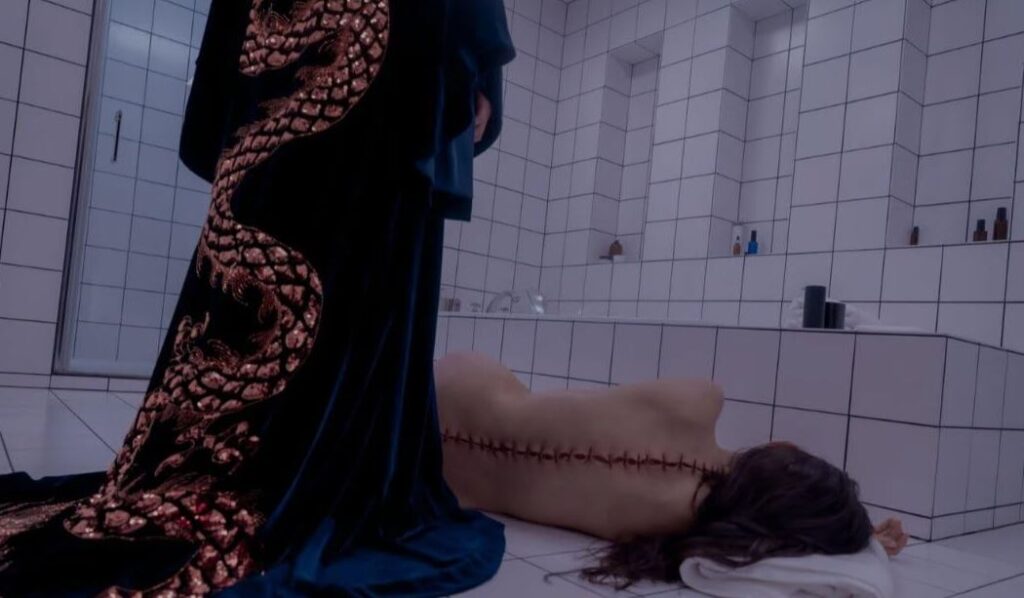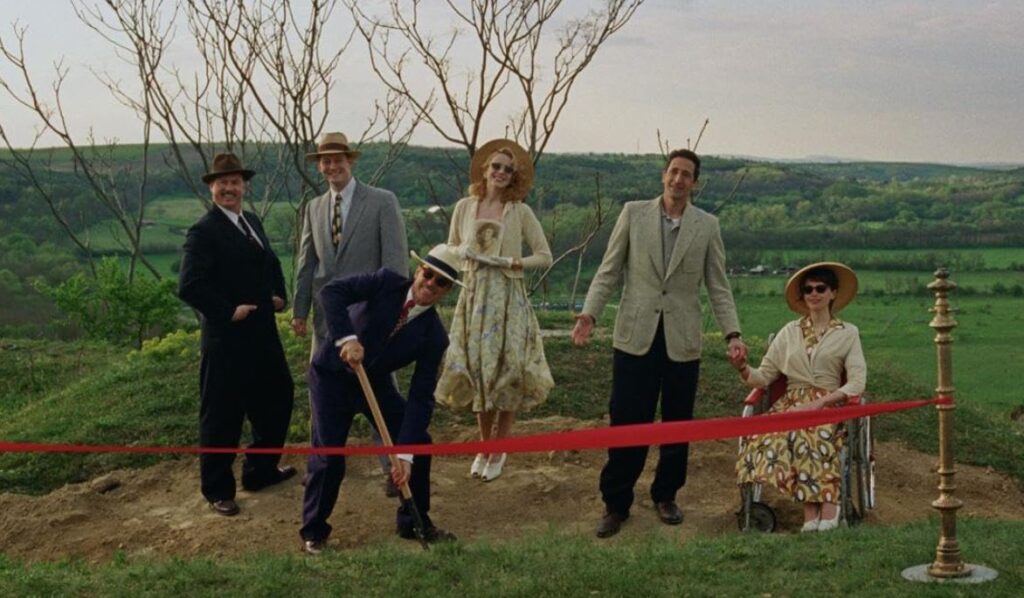
I’ve heard it said that 2024 was a bad year for movies, but I personally have never believed such a thing exists. There are always good and even great movies to be found in any year, now more than ever. I managed to see just over a hundred new releases throughout 2024 (and in the crucial catch-up month of January 2025), and I could probably list at least another hundred I regret having missed thus far. As always, the list below merely represents ten of my favorites, with no pretense toward objectivity or arriving at a definitive “best of the year” list. These are the ten I was most excited to watch a second time, and so I have, for the purposes of a still somewhat arbitrary ranking.
If your favorite is not on the list, just know the odds are good I also liked it, or I just have yet to see it (which still includes two Best Picture nominees, but I’ll get to the Oscars in a few weeks). On the Razzie side of things, I am comfortable with calling Joker: Folie à Deux my least favorite movie of 2024; I know it already has its cult, and they can fucking have it. As for the so-bad-it’s-good category, I will reiterate that I had no more fun in a movie theater in 2024 than when I saw Tommy Wiseau’s Big Shark, which is not to say it is a “good” movie by any means. If it was available to stream or purchase, I would undoubtedly have watched it again and ranked it, but as it stands, it feels like a once-in-a-lifetime kind of thing, almost like a beautiful dream.

THE SUBSTANCE – Coralie Fargeat made a big, bold, bloody splash with her 2017 debut feature Revenge, a smart, feminist take on the rape-revenge thriller that is stylish, riveting, and extremely violent. All of those adjectives apply tenfold to her follow-up, a horrific, hilarious vision of hell that also shares some ideas and visual devices with her 2014 short film Reality+. This movie is so masterful and ambitious it is hard to believe it only took seven years to come to fruition. Another comeback I didn’t know we’d all been missing is that of Demi Moore, who delivers a fearless, ferocious performance now likely to win her first Oscar. Equally brilliant are Moore’s co-stars, Margaret Qualley as Sue and especially Dennis Quaid, almost literally chewing scenery as the sleazy manager of Moore’s Elisabeth Sparkle. Most people, especially those of us who enjoy drinking to excess, have had the feeling of being betrayed by our past selves, having shown no regard in our reckless debauchery for the consequences to be wrought on our future selves.
This is literalized and taken to grotesque extremes in the first act of The Substance, and it only gets crazier as it goes on. Soaked in blood, egg, and birth imagery, it is also an obvious metaphor for motherhood and the parasitic relationship that can develop with an ungrateful child, with Elisabeth becoming a grotesque sort of giving tree for Sue, who eats away at her host and forgets the warning that they are one. It would be a shame to reveal more of this wild, unpredictable narrative, but it is certainly not for the faint of heart. Fargeat expertly balances the splatter with a meticulous sense of control and a razor-sharp eye for composition. The Substance is a Grand Guignol nightmare that delights with every gluttonous frame.

FLOW – This movie is pure magic, a gorgeously animated miracle for children and adults alike. In fact, when I first saw it in the theater (something I can only describe as a spiritual experience), I noticed a few kids in the auditorium and was worried, as I always am under such circumstances, that they might be disruptive. However, I promptly forgot about them until the movie was over and I noticed them leaving quietly with their parents, undoubtedly as mesmerized as everyone else. With no human characters or dialogue and only the most basic survival narrative, Flow captivates with its remarkably lifelike and expressive animals: the dark grey cat who serves as our protagonist, and the enthusiastic Labrador Retriever, mellow and smelly capybara, treasure-hoarding ring-tailed lemur, and outcast secretary bird, with whom the cat forms an unlikely and somewhat grudging bond.
Though there are signs of human life everywhere—in the buildings, statues, and refuse we have left behind—living humans are nowhere to be found, even before the great flood that begins this meandering journey. The animals are refreshingly non-cartoonish and unencumbered by anthropomorphic qualities, making them all the more believable and endearing, and there is a mystical and mysterious quality to the deceptively simple narrative that makes it resonate long after the initial viewing.

HUNDREDS OF BEAVERS – The funniest movie of the year is unlike anything I’ve seen before, though it is an inspired amalgamation of disparate influences ranging from Looney Tunes to silent movie comedies to old-school video games. The sight gags are so frequent and layered, the Rube Goldberg contraptions so elaborate and cartoon-logical, the physical comedy so brilliantly executed that I can see myself endlessly rewatching this movie for years to come. Like all great comedies, it only gets funnier with repeat viewings, and the team of multi-hyphenate auteur Mike Cheslik and star Ryland Brickson Cole Tews (who previously teamed up on the very funny Lake Michigan Monster) have crafted one for the ages. The recurring gag is elevated to an artform here, and the artificiality of the production design and effects are leaned into until they become things of beauty, with packing peanuts filling in for beaver blood and horses that are obviously two guys in a suit (it’s amazing how easy it is to just go with this until you see a third guy try to ride the “horse”). Words really cannot do this lovingly handcrafted, madcap masterpiece justice, but it is the kind of thing for which the word “zany” was invented.

SASQUATCH SUNSET – The wordless opening sequence of Stanley Kubrick’s seminal sci-fi classic 2001: A Space Odyssey is one of the most memorable and influential of all time, but let’s be honest: it could have used more piss, shit, vomit, and fucking. Quest for Fire is another obvious antecedent, and one wishes the Academy had the balls to recognize the far more advanced prosthetic makeup effects in Sasquatch Sunset, at the very least. Completely devoid of human characters or dialogue, and eschewing traditional three-act plot structure in favor of a four-part one based on the shifting seasons, Sasquatch Sunset strikes its humorously engaging balance right from the start, with the breathtaking natural beauty of the forests of Northern California giving way to a grunting rutting session between two of the titular cryptids, while two more look on.
Though this and many other moments are obviously played for comic effect, there is also an undeniable sincerity to the whole project. There is a loneliness, a melancholy, to the hairy band of humanoids, as they seem to recognize that their time is almost done. This unexpected poignancy will perhaps not be so unexpected to anyone who’s seen David and Nathan Zellner’s previous works, such as Kumiko, The Treasure Hunter and Damsel, which share a prankish sensibility along with surprising depth and beauty. Unabashedly scatological and willing to go for the gross-out as well as the big, silly laugh, Sasquatch Sunset is decidedly not for everyone, and that is a huge part of its charm.

FURIOSA: A MAD MAX SAGA – It’s strange that the great George Miller has never made an action movie outside of the Mad Max franchise, since he proves himself to be among the best to ever do it every time he steps back into that universe. Then again, the brutal but beautiful Wasteland that Miller and his team have conjured is so compelling, maybe he just never had the desire to stray outside of it, at least within the confines of the action genre. Furiosa allows a more leisurely exploration of the Wasteland, given that its timeline takes us through some 15 years of its protagonist’s life, rather than the frenetic 48 hours of Fury Road. It is a significantly longer movie, divided into five chapters, and while it is visually and aurally in the same vein as Fury Road, the storytelling is approached somewhat differently, lending credence to the fan theory that each Max movie is another myth passed down by future generations. Max narrates his own story in Fury Road, so we see it as he does, as an adrenaline-fueled war on wheels with only relatively few quiet moments; Furiosa is narrated by a supporting character, and there is more than a hint of unreliability to the narrative, especially in its denouement.
As much as Max himself, Furiosa is a mythical, larger-than-life figure, and her capture by the villainous Biker Horde gang, led by the flamboyant Dementus (Chris Hemsworth, clearly having the time of his life), and their murder of her mother lead her into a violent quest for revenge. Fury Road was already technically the most overachieving sequel of all time, bringing 30 years worth of cinematic advancements to bear on Miller’s already awesome trilogy and fully realizing his vision, and now Furiosa joins the likes of The Godfather Part II, Terminator 2: Judgment Day, and yes, Gremlins 2: The New Batch, as the most worthy companion piece in decades.

THE BRUTALIST – Shot in VistaVision and running 215 minutes (including a built-in 15-minute intermission), this is truly a grand moviegoing experience. For all its darkness and sorrow, it remains exhilarating and so utterly compelling that it never really feels long, while simultaneously achieving its desired epic scope. In the beautifully chaotic overture, László Tóth (Adrien Brody in a career-defining performance) is violently birthed into America (the already iconic upside-down view of Lady Liberty reminiscent of the notion that babies see the world that way at first, as well as the more obvious foreshadowing as to how his time in the country will play out), and our great nation is quick to introduce him into the ways of opiate addiction and indentured servitude. With its stunning cinematography (the establishing shots alone are worth the price of admission), ominous score, and deeply committed performances, this savage take on the American Dream recalls There Will Be Blood, as well as Tár in the verisimilitude of its fictional protagonist, while standing alone as its own undeniable creation. Brady Corbett and Mona Fastvold have nakedly aspired to make the Great American Movie, and the result is like the architectural style from which it derives its title: bold, imposing, and harshly beautiful.

KINDS OF KINDNESS – The latest from dementedly brilliant Greek filmmaker Yorgos Lanthimos is titled in a way that may seem ironic at first glance, until one delves into the origins of the word “kindness.” None of the various characters in the three short films that comprise this wildly original anthology behave in ways seen by normal society as “kind,” but the odd and often disturbing acts of devotion they undertake are all rooted in a desire for “kindness,” defined as a sense of belonging to some sort of familial organization. Kinds of Kindness is certain not to please crowds like previous Lanthimos-Emma Stone collaborations Poor Things or The Favourite, but it is Lanthimos at his most confounding, compelling, and mischievous. The subtle, recurring details and motifs demand multiple viewings, but even if each story can never be “solved,” they are all fascinating in their own right, and even more so as part of this bizarre and endlessly intriguing triptych fable. A darkly comic, sometimes horrific look at the nature of cultish devotion, Kinds of Kindness is a twisted mirror held up to our own desperate need for a sense of belonging.

IN A VIOLENT NATURE – The slasher movie has been done to death in a thousand ways, then resurrected and slaughtered all over again ad nauseam, but like many other overused genres, there is still life to be breathed into its bloody corpse. Cloverfield, for example, revitalized the monster movie by eschewing military or scientific protagonists who could ruin everything with too much exposition, instead focusing on the nameless folks on the ground fleeing the monster. More recently, One Cut of the Dead injected new life into the zombie genre with an ingenious movie-within-a-movie. In Chris Nash’s gorgeously gory debut feature In a Violent Nature, the familiar tropes of the slasher are given a unique twist, the audience’s identification lying not with the expected perspective—that of the victims—but instead with the supernatural killing machine awakened by them.
Unlike similar previous works, though, from the playful (Behind the Mask: The Rise of Leslie Vernon) to the almost unspeakably grim (Henry: Portrait of a Serial Killer), it’s not that we ever truly get to know the monster; we just see the murders from his perspective, cleverly answering many of the questions raised by typical slashers about exactly what the killer was doing before popping out of the shadows at an opportune moment. With no score and long stretches of dialogue-free walking in the woods, it’s almost like a nature documentary interspersed with moments of staggering, unfeeling brutality (one kill near the very middle in particular is an absolute all-timer). This is a movie for the narrow, strange sliver on the Venn diagram of those who enjoy both Gus Van Sant’s Death Trilogy (a stated influence on this film) and the Terrifier trilogy. Never has graphic murder been more oddly soothing.

EVIL DOES NOT EXIST – This is a very deliberate slow-burn, beginning with a long tracking shot of a sky framed by the clawlike branches of barren winter trees. The imagery is crisp and beautiful—you can almost smell the chill winter air—but there is an underlying sense of menace, of impending and inevitable doom. This gives way to a prosaic depiction of daily life in a small village. There is a strong sense of harmonious living established in these quiet, peacefully mundane scenes; the distant gunshots of deer hunters heard throughout seem to foreshadow the imminent disruption of that harmony. Evil Does Not Exist is full of subtle, telling details—small, deceptively simple moments that linger in the mind long after viewing, practically demanding a second watch. The word “not” in the opening title is offset in a different color than the rest, indicating that the message conveyed may be ironic, and that evil very much does exist; it exists in all of us, whether in the choices we make or the ways we react to that which we cannot choose. Or is the title more sincere, denying any true malevolence in our selfish, shortsighted human endeavors? Perhaps, good or evil, nature is ultimately indifferent to our attempts to change or harness it. Evil Does Not Exist raises more questions than it answers, as it should, and anyone who follows it to the abrupt but somehow inevitable gutshot of a conclusion will likely be pondering those questions for a long time to come.

THELMA – The great June Squibb, so often relegated to the role of MVP supporting player in movies like Nebraska or guest spots on TV series like Getting On, at last gets a star vehicle worthy of her talents. Squibb is less profane and more immediately lovable as Thelma Post, a Los Angeles retiree who goes on a road trip of retribution after being taken for $10,000 by a phone scam. With the help of her grandson, Danny (Fred Hechinger), and old friend Ben (Richard Roundtree, in a wonderful final role), she endeavors to track down and confront the villains behind the scheme. Josh Margolin’s delightful debut feature is a love letter to his own grandmother that hilariously subverts the kind of action tropes more often found in movies starring the likes of Liam Neeson, Jason Statham (in fact, the plot of Statham’s own big 2024 release, The Beekeeper, is like a blood-splattered mirror of this one), or Tom Cruise, after whom Thelma models her own feats of derring-do. For a woman in her nineties, rolling across a mattress without making a sound can be a Mission: Impossible-level stunt, and walking away from an explosion without looking back might be more indicative of hearing loss than badassery, but Thelma is not about to sit idly by and let the cockroaches take over. This movie brought many a smile to my face, and a tear to my eye.
Leave a Reply